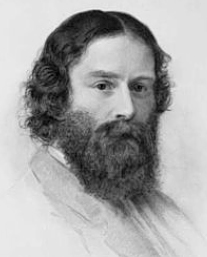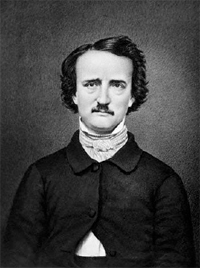The Raven Returns
edgar allan poe bicentennial celebration
Intro | Poe & Boston: 1809-1849 | The Lyceum Fiasco | Lowell & Poe | They Love Poe | Poe & Boston: 2009
JAMES RUSSELL LOWELL & EDGAR ALLAN POE
Two disasters rounded out what had initially promised to be Poe’s most successful year: the unsurprising demise of the Broadway Journal and a lecture in Boston that turned into a public relations fiasco. Still enjoying popularity as the author of “The Raven,” Poe was in demand as a speaker. James Russell Lowell, at this point still admiring of Poe, had arranged for him to read some of his poems before the venerable Boston Lyceum on 16 October 1845.
- James M. Hutchisson, Poe, 2005
Lowell's friendship with Poe was not destined to good fortune. There had been mutal good-will and respect, with kindly offices, on both sides. The conncestion of Poe with Briggs in the editorial conduct of the Broadway Journal was the occasion of an exchange of views and facts between Briggs and Lowell which left Poe's reputation very much impaired in Lowell's judgement.
Poe's admiration for the "author of 'Rosaline,'" on the other hand, did not survive the lines in "The Fable for Critics" in which his own portrait was not inaptly drawn; after Briggs ceased to be his co-editor, Poe attacked Lowell as a plagiarist, and the latter expressed his resentment at length in a passage to be found in his published "Letters"; Lowell, too, had lately met Poe just recovering from a spree, and the impression then received was sufficient of itself to terminate their relations.
A short time after, in October, 1845, occurred to the public scandal of Poe's visit to Boston to read a poem before the Boston Lyceum, which confirmed him in his lifelong dislike of the Bostonians. Later, in an unpublished letter to Mr. F W. Thomas, early in 1849, Poe denounced Lowell with some contempt, and made a public disclosure of his changed attitude by an unfavorable review of "The Fable for Critics," in The Southern Literary Messenger, in February of that year.
- The New York Times, August 19, 1894

Lowell on Poe
Before the Lyceum Lecture
- “Edgar Allan Poe,” Graham’s Magazine, February 1845 After the Lyceum Lecture
-“A Fable for Critics,” 1848 |
|
